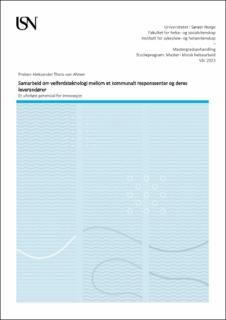| dc.contributor.advisor | Dugstad, Janne Herholdt | |
| dc.contributor.author | Ahnen, Preben Aleksander Tholo von | |
| dc.date.accessioned | 2023-07-24T16:41:32Z | |
| dc.date.available | 2023-07-24T16:41:32Z | |
| dc.date.issued | 2023 | |
| dc.identifier | no.usn:wiseflow:6842104:54648934 | |
| dc.identifier.uri | https://hdl.handle.net/11250/3081150 | |
| dc.description.abstract | Sammendrag
Bakgrunn: Drift av velferdsteknologi er komplisert og avhengig av samarbeid mellom offentlige og private aktører. Sentrale responssenterløsninger og leverandører av velferdsteknologi, er begge sentrale aktører ved drift av velferdsteknologi i kommunal helse- og omsorgssektor. Hensikten med studien er å skildre samarbeidet mellom offentlige og private aktører med utgangspunkt i en sentral responssenterløsning og deres leverandører av velferdsteknologi.
Metode: Studien har en instrumentell casedesign med en eksplorativ-deskriptiv fenomenologisk tilnærming. Det er utført semistrukturerte fokusgruppeintervjuer av tre utvalg med totalt 17 deltakere. Utvalg 1 består av ansatte ved responssenteret. Utvalg 2 representerer støttende kommunale aktører. Utvalg 3 representerer leverandører av velferdsteknologien. Datamaterialet er gjennomgått med en abduktiv tilnærming og analysert ved bruk av Clarke og Braun sin refleksive tematiske analyse.
Resultat: Analyseprosessen resulterte i følgende tematikker: (1) Betydningen av nære relasjoner, (2) Streben etter felles forståelse, (3) Samarbeid, volum av enheter og ressursbruk går hånd i hånd, (4) Det ønskes å samarbeide om innovasjon, men innovativt samarbeid uteblir, og (5) Kontrakten som ankerpunkt for samarbeidet.
Diskusjon og konklusjon: Aktørene beskriver nære relasjoner som viktig og foretrekker samarbeid med personer de kjenner. Videre deler aktørene samme verdigrunnlag, men har ulik opplevelse av den andre sin forståelse av ulike aspekter ved samarbeidet. Samarbeidet om velferdsteknologi er ressurskrevende, avhengig av volum av velferdsteknologi i drift, og er utfordrende å dokumentere. Selv om aktørene har gode forutsetninger for å samarbeide om innovasjon, blir det ikke tilrettelagt for. Samarbeidet handler i hovedsak om drift. Aktørene henviser til kontrakten for hvordan det samarbeides i dag, og hvorfor innovativt samarbeid blir nedprioritert. Kontrakten blir også beskrevet som mulighetsrommet for tilretteleggelse av proaktivt samarbeid.
Nøkkelord: Samskaping, transaksjonskostnadsteori, relasjonell kontraktsteori, responssenter, leverandører | |
| dc.description.abstract | Background: Deployment and management of welfare technology relies on collaboration between public and private actors. Call center and providers of welfare technology play crucial roles in managing welfare technology in the municipal healthcare sector. This study aims to explore how collaboration between these actors are perceived.
Method: The study uses an instrumental case design with an exploratory-descriptive phenomenological approach. Semi-structured focus group interviews were conducted with three different samples, and a total of 17 participants. Sample 1 consist of employees at the call centre. Sample 2 represents other municipal actors that are involved in management of the technology. Sample 3 represents welfare technology providers. The data were analysed abductively using thematic analysis.
Results: The analysis process resulted in the following themes: (1) The importance of close relationships, (2) Striving for a shared understanding, (3) Collaboration, volume of units and utilization of resources go hand in hand, (4) Everyone wants innovative collaboration, but innovative collaboration is lacking, and (5) The contract as an anchor for collaboration.
Discussion and Conclusion: The actors describe close relationships as important and prefer collaboration with others based on relations. While the actors shared common values, they had different experiences regarding each other's understanding of collaboration. Collaboration regarding welfare technology requires significant resources, is dependent on the volume of units in deployment and is challenging to document. Despite having good preconditions for innovative collaboration, it is not being facilitated for, resulting in its failure to materialize. The collaboration revolved around daily management of the deployed technology. The actors refer to the contract as the basis for current collaboration practices and as the reason why innovative collaboration given lower priority. The contract is also regarded as the reference point for enabling proactive collaboration.
Keywords: Co-creation, transactions costs theory, relational contract theory, suppliers, call centre | |
| dc.language | nob | |
| dc.publisher | University of South-Eastern Norway | |
| dc.title | Samarbeid om velferdsteknologi mellom et kommunalt responssenter og deres leverandører - Et uforløst potensial for innovasjon | |
| dc.type | Master thesis | |




